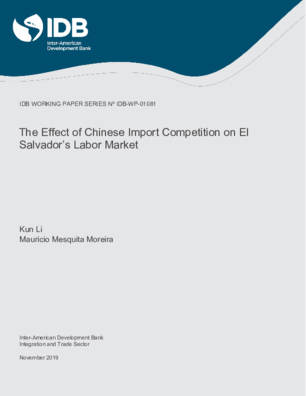The Effect of Chinese Import Competition on El Salvador’s Labor Market
Date
Nov 2019
In this paper, we relate outcomes of El Salvadors local labor markets to their exposure to Chinese import competition. Using annual household surveys for 2000 to 2014, we construct a panel dataset of 61 local labor markets over 15 years to study three sets of outcomes: manufacturing employment, labor informality, and average wage. We find that rising Chinese import competition have negatively affected manufacturing and nontradable employment. Some workers were pushed into agriculture, while others were forced out of the active labor force. Further analysis shows that it is the unskilled workers that were pushed out of manufacturing, while more skilled and professional workers were not affected by Chinese competition. We also find that as workers, especially low-skill ones, have shifted from manufacturing into agriculture due to Chinese import competition, informality has decreased in the former sector and increased in the latter. This change in labor informality is mainly observed among unskilled workers. The informality of workers with high-school diplomas is not affected by competition from China. We do not find that Chinese import competition has a significant impact on the average wages of formal or informal workers or on those of unskilled workers at the conventional significance level.




